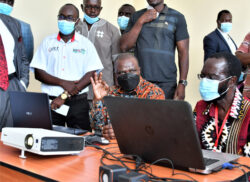
Access to ICT has been touted as a way of contributing to Kenya’s economic growth. Through mobile money payments, Kenyans are saving time previously spent queuing in banking halls, learning in schools has been made easier through the internet which now makes research work easier for students through plenty of resources at a click of a button.
The potential of ICT has seen the government expand internet coverage in the country over the past few years to among others enhance business opportunities, create employment among the youth through online jobs.
The ICT ministry has partnered with parliament to set up innovation hubs across Kenya’s 290 constituencies to offer resource centers with free Wi-Fi.
Currently, there are more than 239 centres (Constituency Innovation Hubs) spread across the country and are open from Mondays to Saturdays for youths to access freely. The project provides safe working spaces for youths who need to innovate and do some work in the online space. The youths are provided with sitting space, laptops and internet in the centres. The objectives of the project include offering support to entrepreneurs and access to free Wi-Fi in all the 290 constituencies countrywide, enhancing awareness and uptake of online platforms for employment and business opportunities and supporting innovative ideas for youths at the centres
Every centre has a manager who manages the daily running of all activities that run in the centre. The centres are used for the delivery of the Ajira digital curriculum to enable youths access online work opportunities. Over 500 Ajira trainings have been held at different centers nationally with the support of the Ministry and the members of Parliament.
Recent Kenya Private Sector Report points to an increase in number of Kenyans taking up online jobs. According to the study the number of digital workers, when projected to the national adult population in Kenya translates to 1.2 million in 2021. The ability to work part time, lack of formal employment and referrals from other digital workers are some of the drivers towards digital gig work.
The government bets on the digital hubs to provide free internet, training and work spaces to enable the public to access online jobs and information for decision making.
The hubs which are technology centers aim to empower the youth to earn decent wages from online work and enable enterprises enhance performance and develop tools to solve complex problems through use of digital platforms.
Speaking at the launch of one of the hubs in Kirinyaga county, ICT Cabinet Secretary Joe Mr Mucheru said, as the world embrace ICT, concept of work changes because people will no longer depend on the traditional formal jobs at physical place for employment. The CS said, instead, gig-work would replace the traditional work where individuals work for multiple employers globally in chargeable chunks.
He said digital work is decent, credible, and prestigious like other highly regarded professions. He noted that digital work requires skills and ethical values and called on parents and guardians to support their children to acknowledge digital work as authentic. He said digital work is lucrative and supports millions of people around the world. The Cabinet Secretary said the active involvement of government in encouraging the youth to take up digital work is a guarantee that online work is genuine. He explained that, the government is empowering the youth with skills and knowledge to exploit the millions of jobs available in the digital space.
“We create the Constituency innovation hubs for people to be able to even access jobs which are outside the country. He noted that the objective of CIH project is to support entrepreneurship countrywide by offering free working spaces equipped with devices and Wi-Fi in all the 290 constituencies countrywide. The project is a partnership between the ministry of ICT, the National Government Constituency Development Fund Board, National Government Constituency Development management committees and members of parliament in line with plans to mainstream ICT to grassroots.
According to the plan every constituency will start with one innovation hub and eventually increase to four per constituency, bringing the total to 1,160 innovation hubs countrywide. The National Assembly select committee on constituency development fund observes that challenges such as the recurrent costs, weak internet signals and inappropriate gadgets have to be dealt with.
